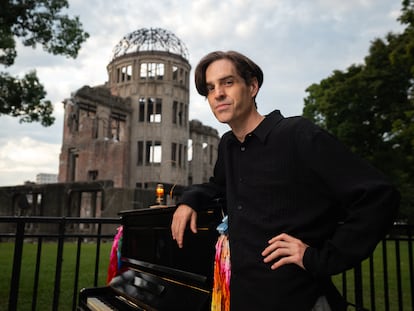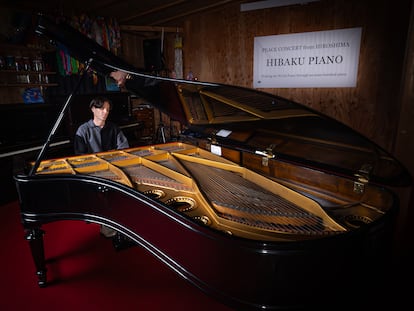A piano that survived Hiroshima commemorates the victims of Nagasaki

What struck him most about Japan was the audience's listening skills. "Even when I played in a restaurant, people maintained an attitude of absolute respect for the music," says Jacob Koller (Phoenix, Arizona, 45) from his home in Kofu, Yamanashi Prefecture. In 2009, the American pianist was received in Tokyo with the honors of a promising young jazz musician who had just collaborated with Terence Blanchard and competed in the Cole Porter scholarship finals in Indianapolis. After his tour of Japan, he was supposed to return to the United States, but he didn't. Because if there was one thing Koller was truly good at, it was improvising. "The Tokyo atmosphere seemed so different from what I was used to that I decided to stay."
Between tours and concerts in Japan, Koller fell in love, had two children, and one day landed a gig in Hiroshima . “I needed to rent a piano, and they gave me the contact information of someone who could help me,” he recalls. Mitsunori Yagawa wasn't the typical supplier he used to haggle with before a performance. In his workshop in the Asaminami neighborhood, the Japanese tuner, a leading figure in his country, guarded seven pianos that had survived the thunder of Little Boy (the atomic bomb dropped on the Japanese city on August 6, 1945). “After one of the many conversations we had, in 2021 he offered me the chance to play one of his instruments at the Atomic Bomb Dome,” he says, referring to the concrete skeleton located at the epicenter of the detonation, declared a World Heritage Site and a symbol of nuclear devastation.
This Wednesday, Koller will sit at one of these pianos to commemorate the 80th anniversary of the bombs that devastated the city in Nagasaki, three days after the hell of Hiroshima. “First, we will visit Shiroyama Elementary School, where 1,400 students died,” explains the performer. “And in the evening, I will play a program at Brick Hall that includes classical works by pianist Rentaro Taki, old folk songs, Ko Matsushita’s hymn “ For the Smiles of the Earth,” and “Rest in Peace ,” his personal tribute to the thousands of victims who could not be identified. There will also be time for improvisation. “I almost never read sheet music; I prefer to let myself be carried away by the energy of the moment.” Just like that day, 16 years ago, when he decided to stay. “Today, even more so.”

For the 2021 concert, Yagawa lent him a Korean Horugel piano, which he still has, embedded in its wood with glass fragments from the explosion. “It has a very distinctive sound,” Koller explains. “The bass is very deep and resonant, while the treble has a sharp, almost ghostly tone.” At first, his fingers couldn’t handle the keys. “During rehearsals, I was nervous; I couldn’t handle the pressure.” Some of the Dome attendees were reluctant to believe that it would be an American musician officiating the tribute to the victims. “I completely understand why they felt that way, but Yagawa encouraged me to keep going. He told me to listen to my heart and trust in my talent.”
Since then, Koller and Yagawa have collaborated on numerous concerts, including a performance at Tokyo's National Stadium in front of 65,000 spectators. "I have always been against war, and since the US invasion of Afghanistan and Iraq, I only support pacifist politicians," confesses the pianist, whose YouTube channel has racked up millions of views. "In my recitals with Yagawa, I cover a very diverse repertoire, from Japanese popular music to classical pieces, jazz standards , and pieces I composed myself." His latest album, Prelude for Peace , is dedicated to his wife, Noriko, who recently passed away. "Before she died, she left me a message on my phone asking me to continue playing for her in heaven."
On the morning of August 6, 1945 , Yagawa's father was 26 years old and working as a firefighter. “Although he was hit by the blast wave 800 meters from ground zero, he miraculously escaped unharmed,” the piano restorer says via video link from Hiroshima. “Nor was anything wrong with my mother, who was at home.” He was born in 1952 and has no memories of the war. “My father began to drink frequently and was always lamenting: ‘What's the point of having survived?’” At school, where Yagawa learned to play the saxophone, a teacher recommended that he train as a piano tuner. He listened and went to work at Kawai, one of the country's leading musical instrument companies. “Eventually, I founded my own company, Yagawa Piano Factory & Workshop,” he says, adding: “I never intended to be a pianist.”
In 1998, the first hibaku piano arrived at his shop. This is how instruments associated with the atomic bomb and the memory of the victims, known as hibakusha , are known in Japan. “The only requirement from the family that donated it was that it be used to promote peace,” Yagawa says. “We started in 2001 with a concert in Hiroshima, and the public response was overwhelming.” His appearances in the press and on television allowed him to connect with other hibaku owners. “All these pianos needed repair, but I always refused to restore them with modern parts that would detract from their original state,” he says. “I simply gave them a second life by adjusting the mechanics and preserving their status as witnesses to a fundamental chapter in our history.”

Anyone who makes a reservation can visit the "atomic pianos," as Yagawa calls them, sometimes decorating them with paper cranes ( orizuru ) as a sign of respect. "An instrument that doesn't make a sound is a relic," reflects the 73-year-old restorer, who has converted his small premises into a cozy museum. "Two of the seven hibaku always remain loaded in my truck, ready to go on tour." This year alone, he will have organized 270 recitals and seminars with the help of his team. In total, more than 3,500 events have taken place over the past quarter-century, featuring artists such as Herbie Hancock and George Winston . "I take care of transporting them by road with one clear objective: for the new generations to learn that war is never the solution."
EL PAÍS





